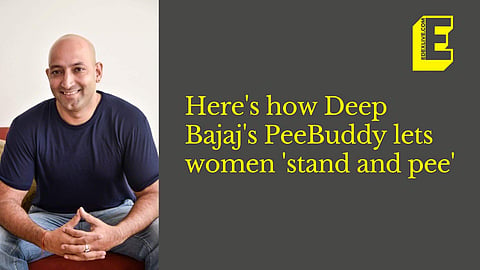

The year was 2013. Four couples were on a road trip from Delhi to Jaipur. While the men drank fluids along the way, Deep Bajaj noticed how the women were even cautious about drinking water. The reason? There was a dearth of clean loos on the way for them to relieve themselves. We are, after all talking about India!
Bajaj remembers the conversations that happened like it was yesterday. After all, it did sort of change his life. "The men were boasting about how god loves us more and decided to give us a body that allows us to stand and urinate. At that time, a friend's wife told us about a man in Europe whom she read about, who'd made a certain apparatus out of used plastic bottles, that let women stand straight and pee. Everyone laughed at it, but I thought that this could be an idea that I could work on," he says.
Two years later, he co-founded his hygiene products start-up and introduced their first product, PeeBuddy. PeeBuddy is a device that is shaped almost like a funnel and lets women stand up and urinate. PeeBuddy, by the way, is biodegradable too. "I am a Delhi boy who used to ride motorbikes a lot when I was younger. Many a time, my friends and I have run out of fuel and we have refilled it using a funnel. We have tried using the same mechanism here," says Bajaj.
This was just the beginning. Finding out how the product was received, Bajaj started developing other products related to female hygiene. "I have noticed how my wife complains of menstrual cramps every month. As a selfish husband, I wanted a solution for this. This led to our biodegradable patches. One just has to stick it to a part of the body that experiences cramps," he says. Like PeeBuddy, most of his others products are biodegradable too. "We also have our own range of anti-chafing creams for women. Then we have introduced rash-free sanitary napkins," he says. These napkins are black in colour by the way.
Bajaj's company was in fact one of the first in the country to introduce menstrual cups, even when the taboo around them was quite prevalent. While he argues that cups are sustainable alternatives for sanitary pads and permits a menstruating woman to even swim, without any hassles, the question of privilege arose. How do women who do not have access to clean water use them properly? "Cups are any day better alternatives to any of the products that the underprivileged women used prior to this. It requires a lesser amount of water than what it requires to wash a cloth napkin and they are much safer hygienic than the other products. They do not create waste problems too," he says.
